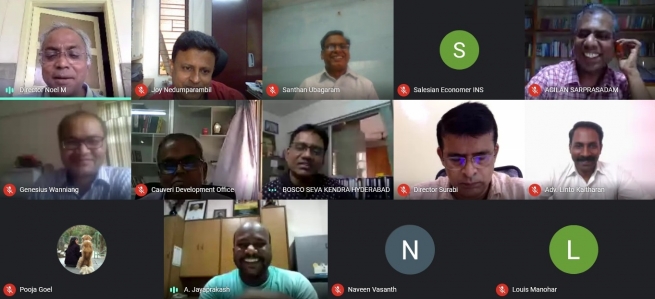Though people can now come out into public and are free to move around, things are no longer the same. Livelihoods have vanished for a huge population of daily wagers across the country, affecting their very survival. For most middle-class people, incomes have been affected. Regular commodities are more expensive and petrol prices soaring.
In the midst of this very volatile situation, the Don Bosco Network through its 11 Don Bosco planning and development partners (PDOs) across various states, geographies, cultures and economies, is keeping its ear to the ground, listening carefully to conversations for indications coming from the people. To be effectively helpful in the current context, we require to understand and formulate responses to various situations. The Don Bosco Network across India is doing just that.
The Don Bosco response to COVID-19 has been coordinated from the beginning, with regular meetings and updates. According to the situation, the team is still reaching out in some states with emergency relief (as of 29 June), relieving more than 1.59 million people from hunger through the distribution of grocery kits, cooked food, and other eatables. It has helped 595,243 people with face masks and other sanitary and protective items and has supported 1,969 families through cash for work or cash transfers.
In view of the facing the challenges in the new normal life with COVID-19, the Don Bosco Network held an online meeting on 29 June 2020. The following are the possible identified strategies:
• Immediate support for staff salaries in Don Bosco schools, technical training centres and other institutions to compensate for the continued loss of income of student fees. A possible workaround is student scholarships enabling them to pay fees where governments allow fee collection. The PDOs are on the job of collecting data for Bosconet to ascertain the school fee support required for rural schools across provinces.
• Develop networks for new unemployed graduates and involve them in tuitions or neighbourhood classes for students in their localities so that they can earn some income.
• Initiate cash-for-work concepts in the various provinces as has been successfully piloted in Chennai and Trichy provinces.
• Develop agro-based projects for local community or neighbourhood development as they are highly useful especially during lockdowns. Help people access agricultural supplies such as seeds and manure, as well as procure soft loans to encourage initiative.
• Survey the situation of migrants returning to cities despite rising COVID-19 infections because of joblessness in their native places. Identify whether they need job placements or skill training to be reemployed in the new COVID-19 situation.
• Lobby with governments on implementing the Interstate Migrant Workmen Act in every state to ensure the full-fledged function of migrant desks in every state.
• Strategic Planning and capacity building of PDOs as per guidelines given the PDO document published in April 2018 at Nairobi.
The Don Bosco Network is initiating these strategies to begin the rehabilitative process for marginalised people across the country, while it continues to explore appropriate and viable solutions to the complicated COVID-19 situation, especially in areas of education, healthcare and livelihoods.
Cheryl Bartholomeusz
Bosconet – DB Network – South Asia


